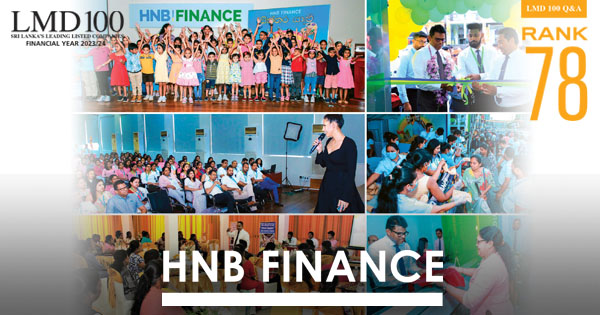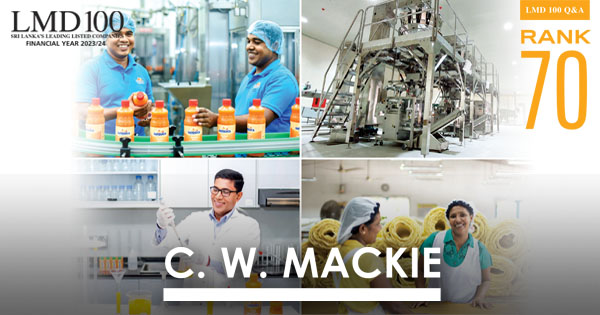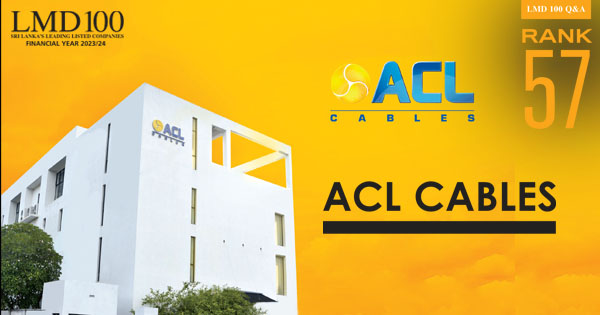LANKA IOC
LMD 100 Q&A
RANK 8
The Asia-Pacific region offers significant growth potential and Sri Lankan businesses are beginning to diversify their markets to reduce reliance on traditional trading partners

Managing Director
Q: What measures have been taken to sustain or grow your company in the past twelve months?
A: Lanka IOC has carried out an extensive modernisation of retail filling stations by replacing the old dispensing units, and improved the look and feel of sheds by installing LED lights, upgrading retail visual identity etc.
We introduced premium auto fuels, and new grades of lubricants and petrochemical products to the market. Retail network and other customer touch points are also being augmented to maintain growth.
Further, we have commissioned a fully automated and women operated Lanka IOC filling station in Colombo – a first ever – showcasing our commitment to inclusivity and empowerment. It’s now one of the top performing filling stations in the island.
The company has also undertaken a large-scale solarisation programme at petrol stations and installed electric vehicle (EV) charging facilities at five petrol stations.
Lanka IOC also believes in growing sustainably by giving back to society, having provided dialysis machines to state hospitals across the island.
We have also provided an ambulance, wheelchairs and financial support for carrying out free cataract operations for the economically weaker sections of society.
Q: What is the contribution you believe your organisation has made to the industry and the wider economy?
A: Over the last two decades, Lanka IOC has been powering the nation through an uninterrupted supply of petroleum products. With the regularity and continuity of fuel supply, Lanka IOC ensured that the nation remained energised through our vibrant channels of distribution with an islandwide footprint of retail sheds.
Over the years, we have introduced a diversified range of products including high end branded fuels, such as the premium fuel XP100, making Sri Lanka the eighth country in the world to offer this.
The Lower Oil Tank Farms at Trincomalee played a pivotal role in supplying petroleum products during the crises.
Moreover, Lanka IOC has built a lube blending plant to meet local demand and for export to neighbouring countries. We have also commissioned Sri Lanka’s first and only indigenous grease manufacturing plant with a blending capacity of 3,000 MT a year.
In addition, we have taken a unique step by arranging life insurance for the team of 1,500 pump attendants employed within our network, coupled with coverage for critical illnesses. This will go a long way in providing them further financial security in case of eventualities.
Sustainable growth of our business and the energy security of the nation is our foremost priority.
Q: As Sri Lanka turns a new page in the context of its politics and the economy, how ready and geared is the corporate sector to drive growth while overcoming the challenges of the past?
A: Large Sri Lankan businesses have shown remarkable adaptability in overcoming past challenges. With the rapid adoption of digital technologies, businesses are embracing innovation to remain competitive.
However, many businesses – particularly SMEs – suffered heavily during the crises, although the government and the Central Bank of Sri Lanka are trying to improve financial access for these small and medium-sized enterprises.
The Asia-Pacific region offers significant growth potential and Sri Lankan businesses are beginning to diversify their markets to reduce reliance on traditional trading partners. Collaborative ventures, such as public-private partnerships (PPP), may become more common in the years to come.

Q: What is your assessment of the country’s risk profile?
A: With a stable government in place, foreign investors, as well as the local corporate sector, will start evaluating new big-ticket investments.
Moderation in crude oil prices and interest rates, and a stable exchange rate, are creating a conducive environment for kick-starting a new economic cycle. Clear policy direction and consistency in regulations will be crucial in building investor confidence and enabling long-term growth.
The COVID-19 pandemic accelerated digital transformation. And the corporate sector’s readiness to innovate and embrace technological advancements will be the key to driving growth. The ability of an economy to drive growth also hinges on the availability of a skilled and educated workforce.
Businesses are upskilling their workforces to meet the demands of a changing economy. During the economic crisis however, there was a notable movement of skilled human resources to other countries – so reduced availability of such resources could be an obstacle to achieving fast-paced growth.
REVENUE (RS. M)
263,569
REVENUE CHANGE
(6)%
PROFIT AFTER TAX (RS. M)
13,945
PROFIT CHANGE
(63)%
TOTAL ASSETS (RS. M)
101,795
SHAREHOLDERS’ FUNDS (RS. M)
73,470
MARKET CAP (RS. M)
62,165
EARNINGS PER SHARE (RS.)
26.19
PRICE EARNINGS RATIO
4.46
EMPLOYEES
159
Telephone: 2475720 | Email: info@lankaioc.com | Website: www.lankaioc.net





